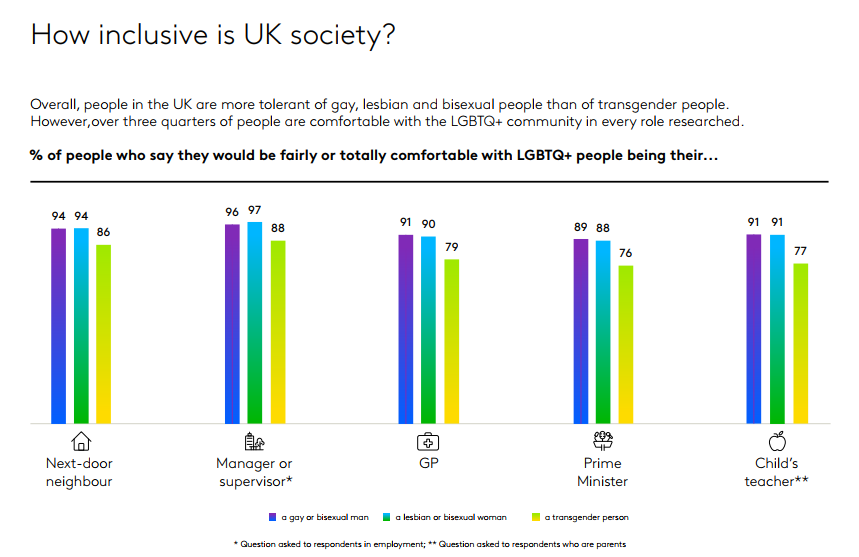As new Religious and Sex Education Curriculum comes into place in England this September, our new study finds the UK as a nation broadly accepting of its LGBTQ+ community, although with more complex views on how to tackle the subject in schools.
The study was conducted using our Public Voice panel among 2,363 people aged 16+ in the UK between 8 July and 6 August 2020. The findings reveal overall high levels of comfort within UK society towards lesbian, gay, bisexual and transgender people. However, acceptance of lesbian, gay and bisexual people was higher than that of transgender people in leadership and community roles.
Levels of comfort
- 92% of people state they are totally or fairly comfortable with a gay or bisexual man, or lesbian or bisexual woman, being their neighbour, manager, GP or Prime Minister.1
- Levels of comfort with transgender people are lower, with 82% of people fairly or totally comfortable with a transgender person as a neighbour, manager, GP or Prime Minister.
- For parents with children aged 16 and under, 91% say they are fairly or totally comfortable with a gay or bisexual man or lesbian or bisexual woman as their child’s teacher, compared to 77% who express comfort about a transgender person as their child’s teacher.

These generally high levels of societal acceptance regarding LGBTQ+ adults in various roles stand in contrast with views about school lessons inclusive of LGBTQ+ people, which were more mixed. Our findings show:
- Almost four in ten (38%) people agree with the statement that it is inappropriate for schools to teach a six-year-old that being gay is acceptable, whilst 52% of people disagree.
- 35% of people agree with the statement that it is inappropriate to teach a twelve-year-old that some people identify as a different gender than the one they were born as. 54% disagree with this statement.

These findings on attitudes towards inclusive education may well reflect a wider issue of LGBTQ+ discrimination in and around schools for parents and children alike. Kantar’s DIVA Survey in 2020 revealed insights into the LGBTQ+ women’s perspective; among those with children, 36% say they have experienced homophobia from other parents and 36% claim their children have been victims of homophobia due to their parents’ sexual orientation.
For more of the findings from this study, please download the infographic.
Other findings
- Comfort is higher amongst younger age groups than older ones: 93% of 16-24-year olds were comfortable with lesbian LGBT people as their neighbour, manager, GP and Prime Minister, compared to 80% of 55-64 year-olds, 77% of 65-74 year-olds and 75% of those aged 75 and over.
- More of those practicing a religion expressed some level of discomfort with 17% compared to 12% of non-religious people saying they were uncomfortable with LGBT people in the roles mentioned.
- Almost four in ten (38%) people agree that it is inappropriate for schools to teach a six-year-old that being gay is acceptable, whilst 52% of people disagree with this statement
- 30% of people agree that it is inappropriate for schools to teach a twelve-year-old that being gay is acceptable, whilst 50% of people disagree
- Four in ten (40%) people believe it’s inappropriate to teach a six-year-old that some people identify as a different gender to the one they were born as, whilst 57% disagree
- 35% of people agree it is inappropriate to teach a twelve-year-old that some people identify as a different gender than the one they were born as, with 54% disagreeing with this statement
When asked comfort level with LGBT people as their child’s teacher, for parents with children aged 16 and under:
- Comfort levels are higher amongst younger parents, as 88% of parents aged 25 to 34 express comfort with a lesbian, gay, bisexual or transgender person as their child’s teacher, compared to 66% of parents aged 55-64.
- 75% of parents who are religious and practising are comfortable with someone who is lesbian, gay, bisexual or transgender being their child’s teacher, compared to 86% of those who are not religious
The study also asked people in the UK about their view on conversion therapy. All major UK medical organisations signed a Memorandum of Understanding condemning the use of conversion therapy in all its form and in 2018 the government pledged to ban as part of its LGBTQ+ equality plan. The research found that:
- Over one third of people in the UK (35%) think that conversion therapy should remain legal in the UK
- Six in ten (60%) think that it should be banned
- Women are much more likely than men to think it should be banned: 63% compared to 57% of men
The research also indicated some of the personal impacts on people within the LGBTQ+ community, providing insight into levels of loneliness of Britons:
- 19% of people who identify as lesbian, gay or bisexual say they have felt lonely (“always or often feel lonely”) compared to just 5% of people who identify as straight/heterosexual.2
Discover more findings from the study here.
Methodological information
A total of 2363 interviews were conducted online among a representative sample of the UK population, aged 16 and over, between 8 July and 6 August 2020. Interviews were conducted using the Kantar Public Voice panel.
1. Figures are the average % comfort with the roles mentioned. Across each role comfort towards LGB people was higher than towards transgender people.
2. Unlike the other questions (asked between 8 July and 6 August 2020), this was asked in late 2019.


